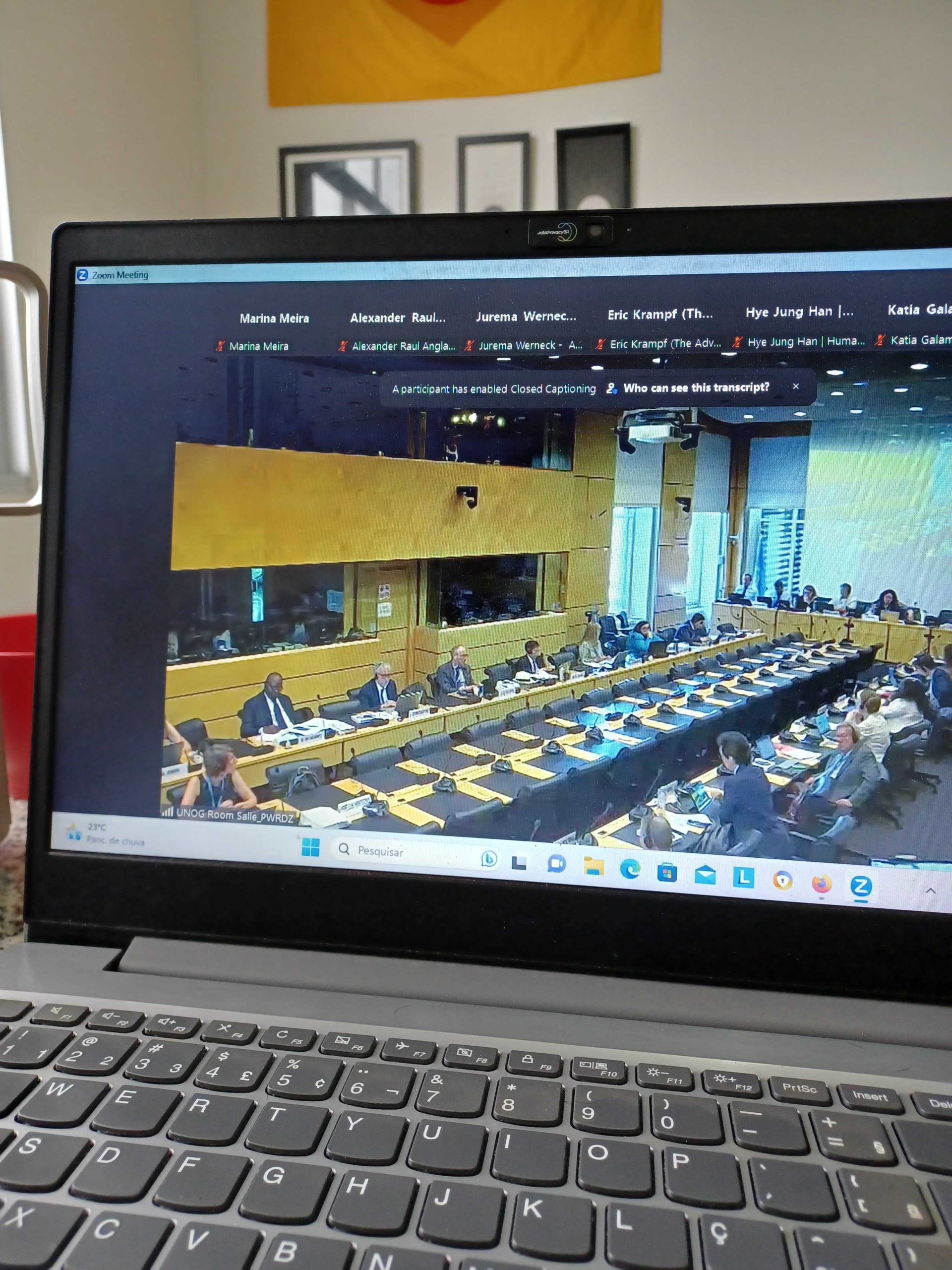Data Privacy Brasil participates in UN’s OHCHR briefing on Brazil
The organization highlighted how the advance of edtech has been violating children’s privacy in the country
Data Privacy Brasil Research Association submitted in May a joint contribution with Privacy International and InternetLab to the United Nations’ Human Rights Office (OHCHR) in advance of the third periodic report of Brazil on the implementation of the International Covenant on Civil and Political Rights during the 138th session of the UN Human Rights Committee.
The submission calls attention to violations to children’s privacy and data protection rights in the use of educational technologies. It discusses the state of the art of the use of technologies in Brazilian public basic education; the use of applications that use AI and the associated risks; and the use of facial recognition technologies in schools and their problems. The submission draws from Data Privacy Brasil’s research project AI in the classroom: models of participation for the school community.
On June 26th, Marina Meira, Head of Projects of Data Privacy Brasil, participated in the OHCHR’s formal and informal briefings on Brazil, in order to present to the members of the UN’s Office the human rights violations that have been faced by Brazilian children in the use of edtech. Data Privacy’s oral contribution to the debate was the following:
My statement is in regards to the submission presented by Data Privacy Brasil Research Association jointly with Privacy International and InternetLab. I will highlight two ongoing processes in Brazil that have been posing severe violations to children’s privacy in the educational context, thus violating article 17 of ICCPR.
The first process is the spread of artificial intelligence tools in schools all over the country without any prior risk assessments, safeguards or considerations to the fact that children are going under a developmental stage. AI edtech often relies on the mining of a great amount of personal data and is also often associated with biases that can cause discrimination and exacerbate inequalities.
The second process is how the procurement of educational technologies has been conducted. The State in different federative levels, especially after the start of the pandemic, has been acquiring edtech based on what is most cost effective, without assessing if the resources protect students’ and teachers’ privacy and human rights. And private companies have been benefiting from an undue interpretation of Brazil’s Procurement Law as if they didn’t profit through the intense harvesting of student data.
Given this worrisome scenario, we recommend the UN Human Rights Committee call on Brazil to:
(i) Regulate edtech, establishing strong safeguards to protect children’s privacy and best interests;
(ii) Regulate AI and consider for such regulation that operations that involve children’s data must be given special attention, so that edtech that uses AI is regulated to reduce harms and make systems more transparent and auditable;
(iii) And adhere to formal public procurement processes when awarding a contract to an
edtech company, while also providing training to educators and public administrators in data protection to enable them to evaluate the risks and benefits of edtech beyond usability.
The full submission can be accessed here.
Veja também
-

Lançamento | Documentário “IA com Direitos: inovação com justiça, inclusão e diversidade”
A produção reúne diversas vozes e chama a atenção para o papel da sociedade civil no debate sobre a regulação da Inteligência Artificial.
-
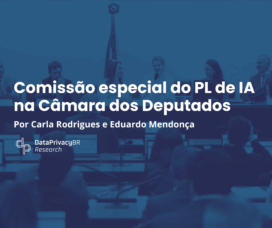
Comissão especial do PL de IA na Câmara dos Deputados
O processo legislativo do PL de IA avança com a formação da comissão especial na Câmara dos Deputados. A Data Privacy Brasil acompanha os desdobramentos, destacando a importância da escuta qualificada da sociedade civil.
-

Monitoramento de fusões e aquisições em mercados digitais: confira o novo banco de dados da SOMO
A SOMO, parceira da Data Privacy Brasil no projeto “Observatório de Fusões Digitais”, lança o Big Tech M&A tracker, iniciativa que consiste em um banco de dados com o objetivo de aumentar a transparência e permitir o acesso público a informações importantes sobre fusões e aquisições. A Data integra o projeto juntamente com mais 15 organizações, nacionais e internacionais.
-

Pode o Cade proteger a Infraestrutura Pública Digital?
Recentemente, o Conselho Administrativo de Defesa Econômica (Cade) realizou uma audiência pública para discutir questões concorrenciais em mercados digitais relacionadas aos sistemas operacionais iOS e Android. Saiba mais sobre o caso no texto escrito por Natasha Nóvoa e Rafael Zanatta.
-

Observatório das Fusões Digitais: Data Privacy Brasil integra nova iniciativa global
A articulação conta com organizações nacionais e internacionais e se dedicará a analisar e contestar os esforços das Big Techs para reforçar seu domínio por meio de fusões e aquisições.
-
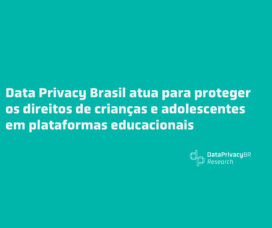
Data Privacy Brasil atua para proteger os direitos de crianças e adolescentes em plataformas educacionais
A Data Privacy Brasil protocolou uma contribuição como amicus curiae no procedimento nº 00261.001328/2023-77, instaurado pela Autoridade Nacional de Proteção de Dados (ANPD). O objetivo é debater e propor medidas contra a coleta e o compartilhamento indevido de dados pessoais de crianças e adolescentes por plataformas educacionais digitais.
-
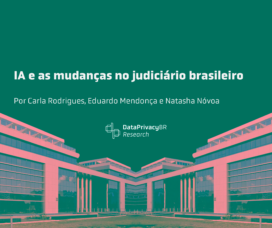
IA e as mudanças no judiciário brasileiro
Em fevereiro de 2025, o CNJ aprovou nova resolução sobre IA no Judiciário, estabelecendo diretrizes para seu uso responsável e transparente. A Data Privacy Brasil contribuiu com recomendações sobre governança ética e proteção de direitos fundamentais.
-
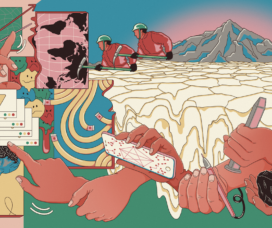
Beyond Digital Rights: Towards a Fair Information Ecosystem?
One of the major challenges in the field of digital rights is the tendency toward segmentation and hyper-specialization in topics such as privacy, freedom of expression, net neutrality, data protection, and the regulation of AI systems. Learn more about the topic in the article published in Tech Policy.
Veja Também
-

Lançamento | Documentário “IA com Direitos: inovação com justiça, inclusão e diversidade”
A produção reúne diversas vozes e chama a atenção para o papel da sociedade civil no debate sobre a regulação da Inteligência Artificial.
-

Monitoramento de fusões e aquisições em mercados digitais: confira o novo banco de dados da SOMO
A SOMO, parceira da Data Privacy Brasil no projeto “Observatório de Fusões Digitais”, lança o Big Tech M&A tracker, iniciativa que consiste em um banco de dados com o objetivo de aumentar a transparência e permitir o acesso público a informações importantes sobre fusões e aquisições. A Data integra o projeto juntamente com mais 15 organizações, nacionais e internacionais.
-

Pode o Cade proteger a Infraestrutura Pública Digital?
Recentemente, o Conselho Administrativo de Defesa Econômica (Cade) realizou uma audiência pública para discutir questões concorrenciais em mercados digitais relacionadas aos sistemas operacionais iOS e Android. Saiba mais sobre o caso no texto escrito por Natasha Nóvoa e Rafael Zanatta.
-

Observatório das Fusões Digitais: Data Privacy Brasil integra nova iniciativa global
A articulação conta com organizações nacionais e internacionais e se dedicará a analisar e contestar os esforços das Big Techs para reforçar seu domínio por meio de fusões e aquisições.
-

Data Privacy Brasil atua para proteger os direitos de crianças e adolescentes em plataformas educacionais
A Data Privacy Brasil protocolou uma contribuição como amicus curiae no procedimento nº 00261.001328/2023-77, instaurado pela Autoridade Nacional de Proteção de Dados (ANPD). O objetivo é debater e propor medidas contra a coleta e o compartilhamento indevido de dados pessoais de crianças e adolescentes por plataformas educacionais digitais.
-

IA e as mudanças no judiciário brasileiro
Em fevereiro de 2025, o CNJ aprovou nova resolução sobre IA no Judiciário, estabelecendo diretrizes para seu uso responsável e transparente. A Data Privacy Brasil contribuiu com recomendações sobre governança ética e proteção de direitos fundamentais.
-

Beyond Digital Rights: Towards a Fair Information Ecosystem?
One of the major challenges in the field of digital rights is the tendency toward segmentation and hyper-specialization in topics such as privacy, freedom of expression, net neutrality, data protection, and the regulation of AI systems. Learn more about the topic in the article published in Tech Policy.
-
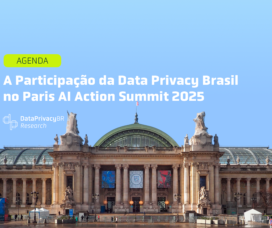
A participação da Data Privacy Brasil no Paris AI Action Summit 2025
A Data Privacy Brasil estará na Cúpula de Ação Sobre Inteligência Artificial (IA) nos dias 10 e 11 de fevereiro de 2025, em Paris. Confira o texto e saiba como será nossa participação.
-

A construção da legislação de Inteligência Artificial no Brasil: análise técnica do texto que será votado no Plenário do Senado Federal
A Comissão Temporária Interna de Inteligência Artificial (CTIA) do Senado Federal aprovou o relatório do substitutivo do Projeto de Lei 2338/2023, que objetiva definir as normas jurídicas de regulamentação dos usos de sistemas de Inteligência Artificial no Brasil. Confira o texto análise sobre o tema em nosso site.
-

IA e os direitos das crianças
Com o avanço das tecnologias digitais e a crescente presença da Inteligência Artificial (IA) em diversos setores, surge uma preocupação central: como proteger as crianças e adolescentes em um cenário onde as interações digitais estão se tornando cada vez mais prevalentes? Saiba mais no texto.
-
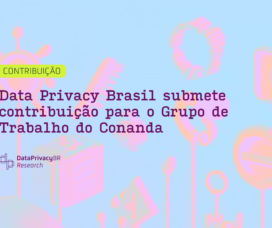
Data Privacy Brasil submete contribuição para o Grupo de Trabalho do Conanda
O objetivo é contribuir para o desenvolvimento da Política Nacional de Proteção dos Direitos da Criança e do Adolescente no Ambiente Digital. Confira quais foram as nossas indicações no texto.
-
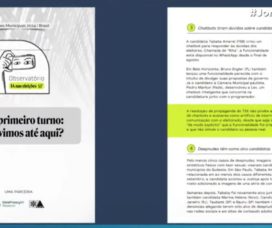
Relatório aponta que uso da IA nas eleições não causou impacto negativo
Na quarta-feira (16), Carla Rodrigues, coordenadora da área de Plataformas e Mercados Dgitais na Data Privacy Brasil esteve presente no programa Jornal da Cultura. A edição repercutiu o relatório "IA no primeiro turno: o que vimos até aqui?", uma parceria entre Aláfia Lab, *desinformante e Data Privacy Brasil.
-
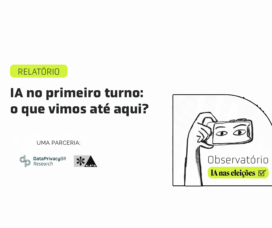
IA no primeiro turno: o que vimos até aqui?
Aláfia Lab, *desinformante e Data Privacy Brasil lançam relatório com análise sobre o uso de IA no primeiro turno das eleições de 2024.
-

‘Nudes’ falsos, deepfake e jingles sintéticos marcam uso da IA no primeiro turno e apontam desafios para 2026
Embora o temor de desinformação massiva não tenha se concretizado, casos registrados na eleições municipais servem de alerta para a corrida presidencial, avaliam especialistas. Confira a reportagem sobre o novo relatório do Observatório IA nas Eleições, parceria entre Data Privacy Brasil, o Aláfia Lab e desinformante.
-

Data participa da 9ª edição do Simpósio Crianças e Adolescentes na Internet
Estão abertas as inscrições para a 9° edição do “Simpósio Crianças e Adolescentes na Internet”, que acontece no dia 23 de outubro de 2024, em São Paulo.
-
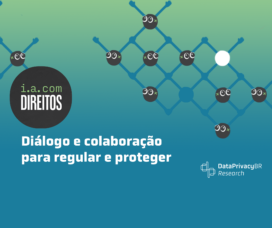
IA com Direitos: diálogo e colaboração para regular e proteger
A Data Privacy Brasil lança projeto para unir pessoas e organizações para uma regulação de IA centrada em direitos no Brasil.
-
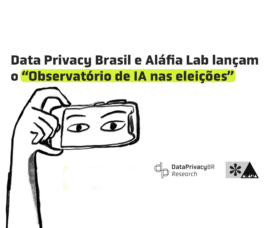
Data Privacy Brasil e Aláfia Lab lançam o “Observatório de IA nas eleições”
A Data Privacy Brasil, em parceria com o Aláfia Lab e o *desinformante, lançam o “Observatório de IA nas Eleições”, uma nova plataforma que tem o objetivo de mapear e registrar casos de uso de IA generativa durante as eleições brasileiras de 2024.
-
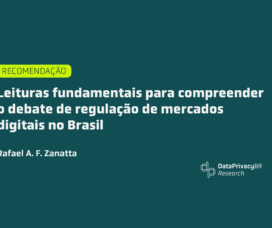
Leituras fundamentais para compreender o debate de regulação de mercados digitais no Brasil
O tema da regulação econômica dos mercados digitais tem se tornado cada vez mais crucial para democracias contemporâneas, como a brasileira. Confira as recomendações sobre o tema em texto escrito por Rafael Zanatta, codiretor da Data.
-
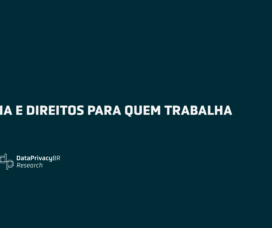
IA e direitos para quem trabalha
Com o avanço das tecnologias digitais e a crescente presença da Inteligência Artificial (IA) em diversos setores, surge uma preocupação central: como proteger quem trabalha em um ambiente de rápidas transformações? Confira no texto.
-
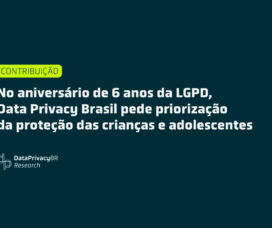
No aniversário de 6 anos da LGPD, Data Privacy Brasil pede priorização da proteção das crianças e adolescentes
A tomada de subsídios é mais um passo na construção de uma agenda de regulação da ANPD neste tema, em julho, diversas organizações da sociedade civil pediram aumento do prazo para a agência devido à importância da discussão.
-
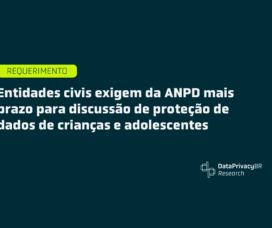
Entidades civis exigem da ANPD mais prazo para discussão de proteção de dados de crianças e adolescentes
Dada a importância do tema e a necessidade de um prazo maior para análise, compreensão e produção de contribuições, diversas entidades assinaram uma Carta Aberta solicitando à ANPD a ampliação do prazo por mais 30 dias.
-

Plataforma de inteligência artificial usa imagens de crianças brasileiras sem autorização
Reportagem do Jornal nacional aborda como uma plataforma de inteligência artificial na Alemanha está usando imagens de crianças brasileiras sem autorização. Rafael Zanatta, codiretor da Data Privacy Brasil fala sobre as principais preocupações relacionadas ao tema.
-

IA na sala de aula: Construindo modelos participativos para a comunidade escolar
Como a comunidade escolar pode participar da governança das tecnologias de ensino-aprendizagem? Para responder a esta questão, lançamos a cartilha “Inteligência Artificial na Sala de Aula: modelos de participação para a comunidade escolar”.
-
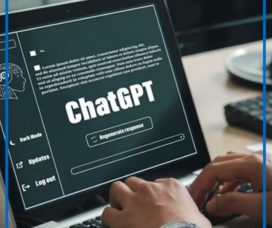
IAs nas eleições: ‘socializar e compartilhar não apenas os benefícios mas também os riscos’
O TSE deve votar hoje as regras para as eleições municipais. Bruno Bioni, diretor do Data Privacy Brasil, fala sobre resolução que deve disciplinar uso de tecnologias de inteligência artificial nas campanhas.
-

Data Privacy Brasil demanda esforços públicos e privados nas eleições de 2024 diante das IAs
A Data Privacy Brasil vem a público elogiar a aprovação de novas regras para eleições de 2024 pelo Tribunal Superior Eleitoral (TSE) na noite de 27 de fevereiro, sob relatoria da vice-presidente da corte eleitoral, ministra Cármen Lúcia, bem como manifestar preocupações com relação aos potenciais usos abusivos de tecnologias da informação nas eleições deste ano.
-
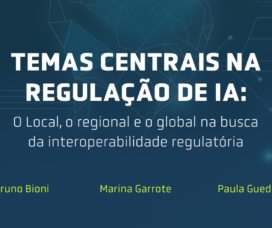
Temas Centrais na Regulação de IA: o local, regional e o global na busca da interoperabilidade regulatória
A Data Privacy Brasil anuncia o lançamento de seu position paper sobre temas centrais na regulação local, regional e global de inteligência artificial. O documento traz os principais pontos de convergência entre mais de 20 fontes normativas, sem deixar de considerar as particularidades necessárias para o contexto brasileiro.
-

Confundida com criminosa por ‘Inteligência Artificial’ denuncia racismo: “Discriminada por ser pobre e preta”
Um erro da IA (Inteligência Artificial) usada no reconhecimento facial das câmeras de um evento em Aracaju (SE), motivou a abordagem. Ela conta que, meia hora após chegar à micareta, três agentes à paisana da PM a interceptaram. Perguntaram o nome dela e pediram o documento. Como ela estava sem o RG, o constrangimento iniciou.
-

EUA adotam novas diretrizes para IA
Na última segunda (30/10), o presidente dos Estados Unidos, Joe Biden assinou um decreto sobre inteligência artificial, o qual busca equilibrar as necessidades de empresas de tecnologia de ponta com a segurança nacional e os direitos dos consumidores. O governo estadunidense almeja estabelecer um conjunto de proteções que possam ser fortalecidas por legislações e acordos globais. Mas quais disposições são essas? Vamos conferir!
-
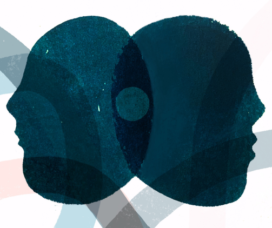
Privacidade e Proteção de Dados: Uma abordagem dos direitos das crianças para a criptografia
Há quem entenda que a garantia do anonimato pela criptografia e a proteção de crianças na internet são coisas separadas, até mesmo opostas. Porém, novo relatório propõe uma olhar mais complexo e multissetorial para a questão.
-

Associação Data Privacy Brasil de Pesquisa participa da Reunião Ministerial da OCDE sobre economia digital
Evento teve como principal tema de debate os caminhos para um futuro inclusivo no ambiente virtual
-
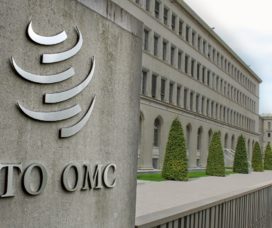
Organização Mundial do Comércio realiza a sua 12ª Conferência Ministerial
A cobertura do evento, dedicado a acordos e negociações envolvendo comércio internacional, foi acompanhada pela Associação Data Privacy Brasil de Pesquisa.
-
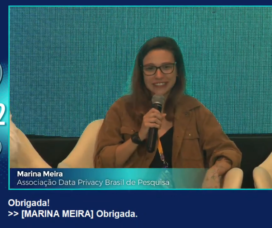
Associação Data Privacy Brasil de Pesquisa participa do painel “Proteção de criança online na pandemia: ferramentas e boas práticas para um ambiente seguro”
Workshop, que faz parte das atividades do 12 Fórum da Internet no Brasil, buscou apresentar e debater o surgimento de novas ferramentas para conter as ameaças que crianças e adolescentes encontram ao utilizarem a internet
-

The regulation of digital platforms is already a reality
The Digital Markets Act is about to be approved in the European Union and is expected to impact other jurisdictions
-
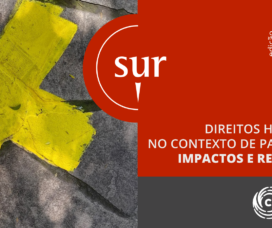
Conectas e Data Privacy Brasil lançam a 31° edição da Revista Sur
Publicação proporciona debates a respeito dos impactos da pandemia sobre os direitos coletivos e liberdades individuais no Sul Global
-

A regulação de plataformas digitais já é realidade
O Digital Markets Act está para ser aprovado na União Europeia e deve impactar outras jurisdições
-

DISCUSSION PAPER No 2/2021: A MULTIJURISDICTIONAL ANALYSIS OF DATA-DRIVEN MERGERS: CURRENT ASSESSMENT AND PUBLIC POLICY PROPOSALS FOR BRAZIL
Data Privacy Brazil Research in partnership with the Brazilian Institute for Consumer Protection (Idec) launches a seven month study about data-driven mergers led by the researcher Lucas Griebeler Motta (University of Chicago).
-

A proteção legal dos dados pessoais de crianças e adolescentes no Brasil
Discussões sobre a proteção de dados de crianças e adolescentes ao longo do processo de discussão da LGPD no Executivo e Legislativo, buscando entender como chegou-se ao atual art. 14 da lei.
-

TikTok e o “caso Antonella” na Itália
Uma menina de 10 anos chamada Antonella foi ao banheiro da sua residência, sozinha, levando seu celular, para realizar um desafio denominado blackout challenge no aplicativo TikTok. O desafio consistia em tentar ficar sem respirar o máximo possível. Para tanto, ela colocou uma faixa ao redor do pescoço, o que gerou um desmaio, seguido de um coma. […]
DataPrivacyBr Research | Conteúdo sob licenciamento CC BY-SA 4.0

